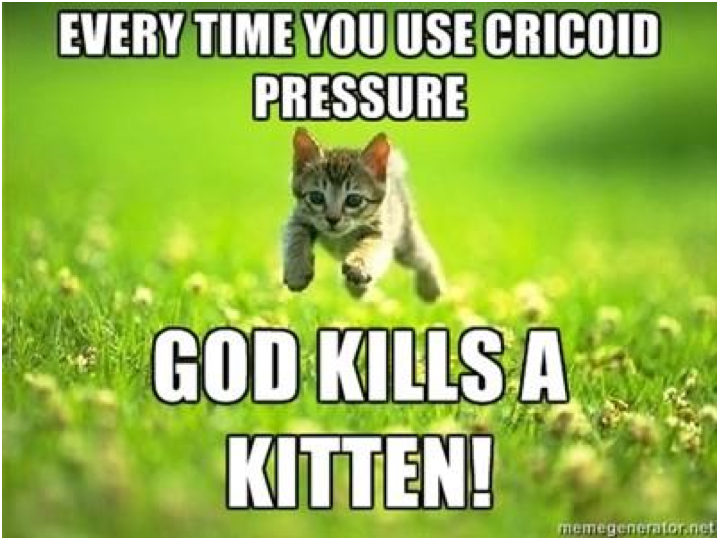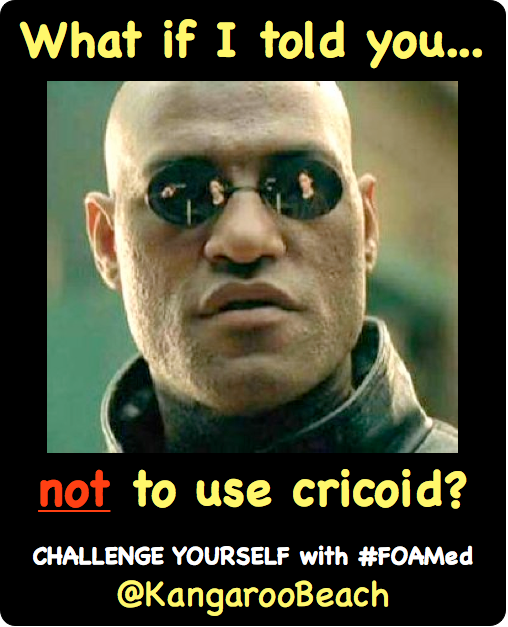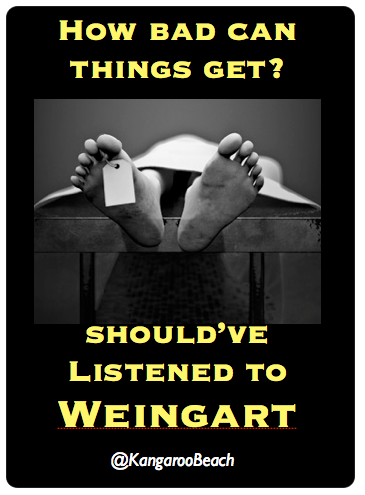I am pleased to say that day one of SMACC2013 has not failed to deliver – blistering talks from the likes of Joe Lex, Scott Weingart, John Myburgh and Cliff Reid were much appreciated by the audience. Highlights for me were Weingart’s suggestion of the sweet harmonies of Nine Inch Nails for trauma RSI (just so long as wasn’t the song “Closer“), Reid asserting that propofol is ‘semen of Satan’ and Myburgh confusing me utterly on fluids. Forget the crystalloid vs colloid debate – he reckons al ICUs should be re-named “The Swamp’ as we are drowning patients with saline.
So was good to put names to a few faces (and apologies to those I have not yet caught up with). Importantly it is good to see a coming together of intensivists, emergency physicians and a smattering of country doctors – all with a common theme – using FOAMed to improve the delivery of patient care. ‘Quality care, out there”
The T shirts also got a few laughs…
THEY WANT TO MODERATE FOAMed
I was a little perplexed to hear a lot of … well fear is perhaps too strong a word..but concern is too weak… whatever, there seems to be a desire to regulate the FOAMed community. If you don’t know what FOAMed is, take a wander over to LIFE IN THE FAST LANE for a crash course. As Joe Lex pointed out, the concept of free meducation has been with us since Hippocrates and is embedded in the eponymous Oath “…and to teach them this art – if they desire to learn it – without fee and covenant; to give a share of precepts and oral instruction and all the other learning”
Simon Carley from BestBets and St Emlyn’s gave an inspiring talk on the perils of SoMe – not so much from within, but the fact that it may unsettle existing power bases and be subject to a set of rules by those who do not understand it. He also warned of the danger of ‘preaching to the converted’ – we need to get the message out to a wider audience and, as Joe Lex suggests, lead by example.
So here are my thoughts on some of the criticisms of FOAM. NB: Minh le Cong has blogged on the future of FOAMed recently.
Criticism No 1 : FOAMed is not really free – people will want to get paid (in money, or in kind) for their time.
I hear this a lot. After all, sharing info for free in an open environment is antipathy in the cut-throat grant-based world of academia. Whilst there will be some who blog for self-aggrandisement (although I am hard pushed to think of any), most FOAMites do so because they believe in sharing knowledge, enjoy debating (especially those of us, like rural docs, who operate in isolation) or have a genuine desire to help their colleagues. Me, I have a self-interest at heart – if I can persuade colleagues in rural medicine to adopt some of the practices I have learnt about through FOAM, my job will be so much easier as I move around the country. Not just doctor s- but fellow clinicians like nurses and radiographers…and institutions.
Criticism No 2 : There is no ‘quality’ – how do we know that people blogging are who they say they are, do the things they say they do etc?
Um, not really. If using Twitter, can click on a user to see his/her name. Like a hawker selling his/her wares in the marketsplace, you will soon develop an eye for the trustworthy ones. People who use real names behind their twitter handle, give a good descriotion of who they are and what they do are generally to be trusted. Similarly, those with lots of followers are probably worth reading. But beware group think…
As for quality…well, this is the old Encyclopaedia Brittanica vs Wikipedia debate. I know which one has most share nowadays – the strength of FOAM lies in rapid ability to change and peer-review. Which leads on to …
Criticism No 3 : FOAM has no peer-review. How can it be trusted?
Well it DOES have peer review – the crowd. When people say daft things, or there is major dissent, then the crowd (usually through online comments to blogs) will allow discussion.
I’ve been involved with Doctors.Net.UK since it’s inception back in 1998. The power of that medium (essentially a bulletin board) is active (and sometimes heated) discussion between the 180,000 UK Doctors who use it. But that is where the BEST learning happens.
Besides, is the learning from wise old professors of medicine peer-reivewed? I had a gutful of ‘my way or the highway’ teaching as a junior – in fact, I encountered it again recently when doing a year of anaesthetic upskilling in NSW – not just learning via humiliation, but an insistence that ‘their way’ was best way despite evidence to contract from literature (and colleagues). Yet such behaviours tolerated as ‘good at blocks’ or ‘just his way’. All I learn from these individuals is how NOT to be!
Criticism No 4 : Without a curriculum, FOAM may encourage novices to do “crazy things”
An example was cited of an ED reg ‘doing something unfamiliar because they’d read about it on a blog’ with the implicit suggestion that FOAMed content needs to be moderated.
Oh bollocks!
Look, for me the whole POINT of FOAMed is that it caters to the discerning palate. It is NOT entry-level – that’s what medical school, textbooks, journal clubs and primary/exit examinations are for. They give you the framework to practice the art of medicine.
But along with getting one’s ‘ticket’ in whatever field, is the commitment to lifelong learning. We won’t get that from books..nor conferences. Information moves too quick. Same with the process of publishing papers (don;t get me wrong – this is important, just takes a while)
I can illustrate with examples from my experience of FOAMed – in past 18 months, concepts such as apnoeic oxygenation during RSI, use of checklists, switch to rocuronium over sux for trauma RSI, considering resus room management and human factors have changed the way I practice medicine. I think that is a good thing. But theses concepts have been gleaned by conversations with experts via the blog-o-sphere….not through books/conferences.
Reputed drunkard Alan Grayson used the illustration of a kitchenhand moving from scut work, through sous-chef to masterchef. We are all on that journey – and whilst initially have to learn the ropes, FOAMEd helps masterchefs share recipes. Over time the info will be disseminated downstream into protocols etc … but FOAMed is really about keeping the pot bubbling and generating new innovative dishes for the discerning palate. It ain’t McDonalds!
Which leads on to…
Criticism No 5 : Without moderation, people will say ‘bad’ things.
Yes, they will. But people may say ‘bad things’ anyway. As one who approaches almost Gordon Ramsay-like profanity at times, I recognise the need to exercise caution.
That said, sometimes people NEED to say things. Those in the UK may be familiar with the ‘Scot Junior’ affair a few years back, where a relatively junior trainee made criticism of a senior member of the medical establishment on a closed forum (Doctors.net.uk) under a pseudonym. When pulled up, he immediately apologised and withdrew the comments…but was subject to a witchhunt by senior meducationalista that affected his career and went well beyond the bounds of acceptable reprimand. Sadly the mediculationalista involved lack insight into their own behaviours – and it is these sort of people who are watching FOAMed VERY closely. Still sometimes as TISM say, you have to call a spade a spade.
But is moderation really needed? We already have a code of conduct – guidelines of ‘being a good doctor’ from the likes of GMC and AHPRA. Stick to those, don;t say anything that you wouldn’t mind either prefacing with “M’lud” or splattered over the front page of local paper, and you will be right. Karel Habig from GSA-HEMS suggested that the journalism code of conduct might be best way forward. As long as it’s not leading to a ‘News of the World’ scandal we should be alright.
Actually, perhaps the ‘masterchef’ analogy is incorrect – we should compare ourselves to cub reporters, then specialist reporters in different arenas…then those who have the courage to go off (FOAMEd) and do something different – perhaps picking up a Pulitzer on the way.
Criticism No 6 : Without a curriculum, we will miss important topics.
An example as given of the fact that AIRWAY and SHOCK predominate in FOAMed resources. I agree, but I think FOAMites have enough insight to realise that there are far more topics that could (and should) be discussed. But the uptake has mostly been by EM and ICU docs – who, guess what, mostly want to talk about airway and shock. This will change – Mike Cadogan’s GMEP project will allow a fine repository of all sorts of info – and up-and-coming stars like Gerry Considine will be pumping out content.
Actually, the more I think about it, I reckon the broad brush knowledge base of the true generalist (the rural doc or EM physician) is the best mining ground for more material.
But you know what – the danger of FOAMed is not that it is anarchic and unmoderated – that is it’s strength. The danger is that the users are converts…we DO need some form of body to articulate the strengths of FOAMed to other agencies…and we do need to get the message out there to other doctors.
Most of all, we need to lead by example. So tomorrows talk at SMACC2013 will be my last nod to Anglo-Saxonisms in a presentation…
What do YOU think about FOAMed? Comments welcomed….



Hi Tim,
Great post
Just on point 5 and 6. Around the discussion of curriculum. Certainly the concept of a #foamed curriculum was raised at smacc but I think Vic Brazil said it best when she explained that social media was just a tool, like prezi, PowerPoint etc etc. we already have curriculums eg CEM, ACEP, ACCRM etc etc and we simply use SM to help us gain knowledge related to these curriculums or our own personal learning goals.
However we must ensure that with the eagerness to embrace #foamed we caution people not to assume everything they need to learn can be gained just through SM. we all must use multiple tools to achieve this and Vic showed a great example of big topics (hand washing and indigenous medicine) somewhat neglected by #foamed at the moment. I think it was a great moment for us to reflect on this sobering thought and think about what else we might be neglecting 🙂
Looking forward to tomorrow, I better get to sleep 🙂
Hi Tim,
Great post
Just on point 4 and 6. Around the discussion of curriculum. Certainly the concept of a #foamed curriculum was raised at smacc but I think Vic Brazil said it best when she explained that social media was just a tool, like prezi, PowerPoint etc etc. we already have curriculums eg CEM, ACEP, ACCRM etc etc and we simply use SM to help us gain knowledge related to these curriculums or our own personal learning goals.
However we must ensure that with the eagerness to embrace #foamed we caution people not to assume everything they need to learn can be gained just through SM. we all must use multiple tools to achieve this and Vic showed a great example of big topics (hand washing and indigenous medicine) somewhat neglected by #foamed at the moment. I think it was a great moment for us to reflect on this sobering thought and think about what else we might be neglecting 🙂
Looking forward to tomorrow, I better get to sleep 🙂
Pingback: SMACC 2013 Day One report by KI Docs | PHARM
Pingback: SMACC 2013 Day One report by Minh | PHARM
I agree!
Very thoughtful analysis of some of the criticisms aired yesterday re FOAMed. To me the greatest danger will be the inevitable hijacking of the blogosphere by commercial interests. Don’t forget the web’s humble origins as a scientific forum. Or Facebook, twitter etc as pure “social” media. Witness now their use in viral marketing, electioneering, Nigerian scams. I can’t see FOAMed remaining unadulterated for long. I hope I’m wrong.
Pingback: FOAM-U - BoringEM | BoringEM
Pingback: FOAM + Curriculum = FOAM-U? - BoringEM | BoringEM
Pingback: FOAM • LITFL